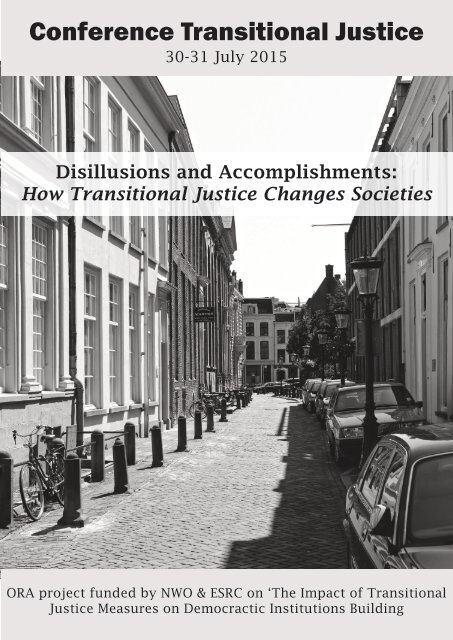Conference-Transitional-Justice-Program
Conference-Transitional-Justice-Program
Conference-Transitional-Justice-Program
Create successful ePaper yourself
Turn your PDF publications into a flip-book with our unique Google optimized e-Paper software.
<strong>Conference</strong> <strong>Transitional</strong> <strong>Justice</strong><br />
30-31 July 2015<br />
Disillusions and Accomplishments:<br />
How <strong>Transitional</strong> <strong>Justice</strong> Changes Societies<br />
ORA project funded by NWO & ESRC on ‘The Impact of <strong>Transitional</strong><br />
<strong>Justice</strong> Measures on Democractic Institutions Building
Description<br />
Practical information<br />
Date: 30-31 July 2015<br />
This workshop engages the central thematic of the ORA-NWO Project on ‘The Impact<br />
of <strong>Transitional</strong> <strong>Justice</strong> Measures on Democratic Institution-building’; namely the challenges<br />
of transitional justice (TJ) in providing accountability for past abuses and building<br />
a new, stable democratic state. The demands of TJ are both retrospective and prospective,<br />
creating different expectations across wide-ranging contexts. The study of<br />
TJ requires interdisciplinary dialogue that can respond to the criticisms for its lack of<br />
consensus in the use of concepts, methods, and variables of measurement and impact<br />
of TJ.<br />
The dissimilar uses of these tools for analysis make it difficult to assess whether TJ<br />
actually helps to establishing a minimum of stability for the forthcoming democracy.<br />
Thus, the aim of this workshop is to facilitate dialogue among scholars engaged<br />
in the study of TJ from different perspectives and fields of expertise. The workshop<br />
questions the alleged role of transitional justice in achieving promises of peaceful<br />
and democratic futures for societies that have suffered oppressive rule. The papers<br />
explore multiple ways in which TJ has been related to democracy in a comparative<br />
perspective and following in depth case research studies.<br />
Begin: 14:00, Thurs 30 July 2015<br />
End: 14:00 Fri 30 July 2015<br />
Venue: Raadzaal, Achter Sint Pieter 200,<br />
3512 HT Utrecht, The Netherlands<br />
Utrecht University, Netherlands Institute of Human Rights (SIM)<br />
+31 30 253 8033<br />
www.uu.nl/sim<br />
www.tjdi.org<br />
Registration<br />
Please send an email to Charlie Panhuyzen C.L.Panhuyzen@uu.nl.<br />
Organisation<br />
Sandra Rios Oyola & Anja Mihr (Utrecht University)<br />
ORA project funded by NWO and ESRC on ‘The Impact of <strong>Transitional</strong> <strong>Justice</strong> Measures<br />
on Democratic Institutions Building www.tjdi.org.<br />
The Netherlands Institute of Human Rights (SIM) www.uu.nl/sim.<br />
Getting there:<br />
By train: you can take a direct train to Utrecht Central Station from almost every train<br />
station in the Netherlands.<br />
By bus: from Utrecht Central Station take a bus at the center side to Janskerkhof (bus<br />
no. 2, 5, 8, 28, 51, 52, 55, 74, 77).<br />
It is a 10-minute walk from the trainstation.<br />
By car: you can park in the center of town or opt for a cheaper P+R park and take public<br />
transport to Janskerkhof, check this webiste for more information on parking .
<strong>Program</strong><br />
30 July 2015<br />
2:00-2:30 Introduction<br />
2:30-4:00 Panel 1<br />
4:00-4:15 Break<br />
4:15-5:15 Panel 2<br />
Anja Mihr (TJDI principal investigator, Utrecht University), Antoine Buyse<br />
(Director of the Netherlands Institute of Human Rights –SIM, Utrecht Uni<br />
versity), and Sandra Rios Oyola (TJDI postdoctoral research fellow,<br />
Utrecht University).<br />
Roddy Brett – Lina Malagon (University of St. Andrews / University of Ox<br />
ford): ‘“To Desist is not an Option”: The Role of Victims’ Delegations in<br />
the Santos-FARC Peace Talks’<br />
Amaia Alvarez (Ulster University): ‘Exploring intra-democratic transitions:<br />
the definition of victim in Northern Ireland and the Basque country’.<br />
Juan Pablo Pérez-León Acevedo (Åbo Akademi University, Institute for<br />
Human Rights):‘Victims of Serious Human Rights Violations, International<br />
Courts that Issue Reparations Orders as <strong>Transitional</strong> <strong>Justice</strong> Mechanisms<br />
and Democracy’<br />
Anita Ferrara (Center for <strong>Transitional</strong> <strong>Justice</strong> and Development): ‘Truth<br />
Commissions as Means of Ethical and Institutional Transformation’<br />
Stefanie Lemke (Utrecht University): ‘<strong>Transitional</strong> <strong>Justice</strong> and Judicial<br />
Independence’<br />
<strong>Program</strong><br />
31 July 2015<br />
9:00-11:00 Panel 3<br />
11:00-11:20 Break<br />
Caterina Bonora (Bremen International Graduate School of Social<br />
Sciences): ‘Creating an open space or an exclusive club? Evaluating the<br />
inclusiveness of bottom-up approaches to transitional justice’<br />
Aviezer Tucker (Davis center, Harvard associate): ‘Post-Communist<br />
<strong>Transitional</strong> <strong>Justice</strong> and Rule of Law, 25 years later’<br />
Sandra Rios Oyola (Utrecht University): ‘How TJ mechanisms promote<br />
civic engagement and Democratic Institution-building’<br />
Elisabeth Bunselmeyer (German Institute of Global and Area Studies):<br />
‘<strong>Transitional</strong> <strong>Justice</strong> and Social Cohesion in Postwar Societies. The Case<br />
of Peru’<br />
11:20-12:50 Philipp Schulz (<strong>Transitional</strong> <strong>Justice</strong> Institute at Ulster University):<br />
‘Evaluating the Impact of <strong>Transitional</strong> <strong>Justice</strong>: Quasi-Experimental Re<br />
search Designs and Structured Focused Comparisons as Tools for<br />
Assessing the Impact of <strong>Transitional</strong> <strong>Justice</strong> Instruments’<br />
Valerie Arnould (TJDI project / Egmont Institute). ‘Assessing transitional<br />
justice impact: exploring pathways of impact‘<br />
Lukas van de Berge (Utrecht University): ‘The Right and the Good in<br />
Aeschylus’ Oresteia and Yael Farber’s Molora: <strong>Transitional</strong> <strong>Justice</strong><br />
between Deontology and Teleology<br />
5:15-6:00 Reception<br />
12:50-1:20 Conclusions
Colophon:<br />
Pictures by Eric de<br />
Redelijkheid, prodigaldog,<br />
Davidlohr<br />
Bueso, Jens Aarstein<br />
Holm, Helen Harrop<br />
and United Nations<br />
Photo.<br />
A Production by the ORA-NWO Project and the SIM


